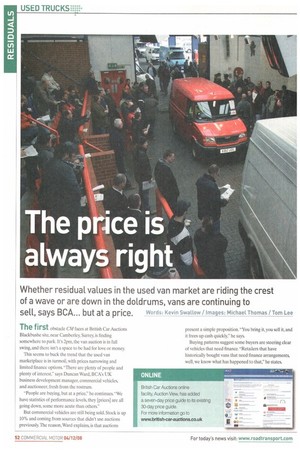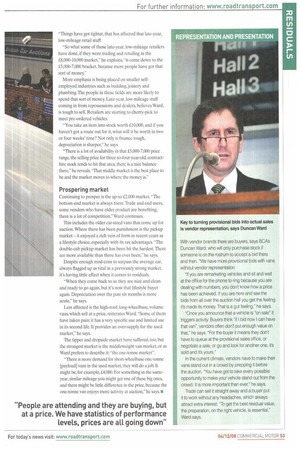Whether residual values in the used van market are riding
Page 52

Page 53

If you've noticed an error in this article please click here to report it so we can fix it.
the crest of a wave or are down in the doldrums, vans are continuing to
sell, says BCA... but at a price. Words: Kevin Swallow / Images: Michael Thomas / Tom Lee The first obstacle CM faces at British Car Auctions Blackbushe site, near Camberley, Surrey, is finding somewhere to park. It's 2pm, the van auction is in full swing, and there isn't a space to be had for love or money.
This seems to buck the trend that the used van marketplace is in turmoil, with prices narrowing and limited finance options. "There are plenty of people and plenty of interest," says Duncan Ward, BCA's UK business development manager, commercial vehicles, and auctioneer, fresh from the rostrum.
"People are buying, but at a price," he continues. "We have statistics of performance levels, they [prices] are all going down. some more acute than others."
But commercial vehicles are still being sold. Stock is up 10% and coming from sources that didn't use auctions previously. The reason, Ward explains, is that auctions present a simple proposition. "You bring it, you sell it, and it frees up cash quickly," he says.
Buying patterns suggest some buyers are steering clear of vehicles that need finance. "Retailers that have historically bought vans that need finance arrangements, well, we know what has happened to that," he states. "Things have got tighter, that has affected that late-year, low-mileage retail stuff.
"So what some of those late-year, low-mileage retailers have done, if they were trading and retailing in the f8,000-I0,000 market," he explains,"is come down to the L5,000-7,000 bracket, because more people have got that sort of money."
More emphasis is being placed on smaller selfemployed industries such as building, joinery and plumbing. The people in these fields are more likely to spend that sort of money. Late-year, low-mileage stuff coming in from repossessions and dealers, believes Ward, is tough to sell. Retailers are starting to cherry-pick to meet pre-ordered vehicles.
"You take an item into stock worth £10,000, and if you haven't got a route out for it, what will it be worth in two or four weeks' time? Not only is finance tough, depreciation is sharper," he says.
"There is a lot of availability in that L5,000-7,000 price range, the selling price for three-to-four-year-old, contracthire stock tends to hit that area, there is a nice balance there," he reveals:ghat middle market is the best place to be and the market moves to where the money is."
Prospering market
Continuing to prosper is the up-to £2,000 market. "The bottom-end market is always there. Trade and end users, some vendors who have older product are benefiting, there is a lot of competition," Ward continues.
This includes the older car-sized vans that come up for auction. Where there has been punishment is the pickup market — it enjoyed a rich vein of form in recent years as a lifestyle choice, especially with its tax advantages. "The double-cab pickup market has been hit the hardest. There are more available than there has ever been," he says.
Despite enough mod-cons to surpass the average car, always flagged up as vital in a previously strong market, it's having little effect when it comes to residuals.
"When they come back to us they are nice and clean and ready to go again, but it's now that lifestyle buyer again. Depreciation over the past six months is more acute," he says.
Less affected is the high-roof, long-wheelbase, volume vans, which sell at a price, reiterates Ward. "Some of them have taken pain: it has a very specific use and limited use in its second life. It provides an over-supply for the used market," he says.
The tipper and dropside market have suffered, too, but the strongest market is the middleweight van market, or as Ward prefers to describe it: "the one-tonne market".
"There is more demand for short-wheelbase one-tonne [payload] vans in the used market, they will do a job. It might be, for example, £4,000. For something in the sameyear, similar mileage you might get one of these big ones, and there might be little difference in the price, because the one-tonne van enjoys more activity at auction," he says. oi With vendor brands there are buyers, says BCA's Duncan Ward, who will only purchase stock if someone is on the rostrum to accept a bid there and then. "We have more provisional bids with vans without vendor representation.
"If you are remarketing vehicles and sit and watt at the office for the phone to ring because you are dealing with numbers, you don't know how a price has been achieved. If you are here and see the bids from all over the auction hall you get the feeling it's made its money. That is a gut feeling." he says, "Once you announce that a vehicle is "on sale" it triggers activity. Buyers think "if I bid now I can have that van", vendors often don't put enough value on that," he says. "For the buyer it means they don't have to queue at the provisional sales office, or negotiate a sale, or go and look for another one, it's sold and it's yours."
In the current climate, vendors have to make their vans stand out in a crowd by prepping it before the auction. "You have got to take every possible opportunity to make your vehicle stand out from the crowd. It is more important than ever." he says.
Trade can sell it straight away and a buyer put it to work without any headaches, which always attract extra interest, "To get the best residual value, the preparation, on the right vehicle, is essential," Ward says.




















































































































































